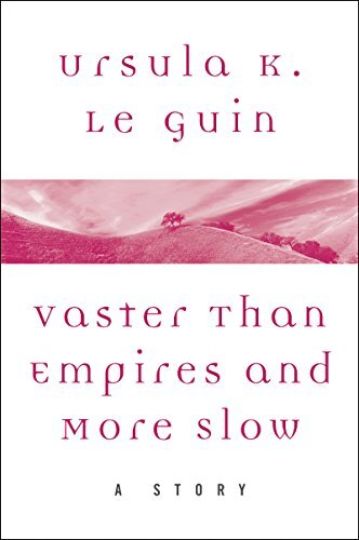Kris
I must have read this story before, as I have read The Wind’s Twelve Quarters, but I have no memory of it. I think the reason maybe that the next year Le Guin would put out “The Word For World Is Forest” which makes uses of similar concepts in more dramatic and vivid way. However, this is not a review of that novella, nor should the similarity be seen to the detriment of either. Merely that I have to disentangle them in my mind (pun intended).
This is a great first contact story with an intelligence completely unlike our own. These are always great as they allow us to see ourselves from the outside and imagine aliens that are not the same as contemporary earth people, only with unpronounceable names and funny foreheads. This very much reminds me of Solaris (which was just published in English so it is possible, but unlikely, Le Guin had this for inspiration).
Le Guin style is always very readable, combining a real understanding for how people work with vivid description that never feels overly florid.
There are some slight down points. It relies on an outdated understanding of autism for some of the story. We also do not get to truly understand the alien perspective, rather just have humans guessing what it could be.
But overall, a strong story.
Brian
So “Vaster Than Empire and More Slow” was nominated for the 1972 Hugo for Best Short Story, beaten out by Larry Niven’s at least equally classic “Inconstant Moon.” This is one of those years where the Best Novelette category is gratuitously absent, and I can’t help but think about what would’ve actually won Best Short Story if Best Novelette had been in place, considering both Le Guin and Niven’s stories belong very much in the latter category.
Anyway, I read “Vaster Than Empires” as part of the first annual Best Science Fiction of the Year, edited by the late Terry Carr. This is part of the Hainish cycle, which contains mostly my favorite work by Le Guin, with “Vaster Than Empires” holding up with its brethren quality-wise. Despite being published in 1971 it almost feels like a throwback, with the deceptively simple Campbellian premise of a survey team making first contact with what happens to be a single-biome planet.
Except one of the survey members is an empath whose life and psychology is utterly malformed by the fact that he feels everyone else’s feelings, and that this planet being surveyed is host to a gargantuan planet-spanning forest that seems to be collectively sentient. Despite the surface comparison to “The World for World Is Forest” (also a Hugo-winner), I was much more reminded of a slightly earlier short story by Le Guin, “Nine Lives,” which similarly examines the breadth and limits of empathy. Difference being that in “Nine Lives” we’re given a character who is cut off from people he is all but telepathically connected to, and in “Vaster Than Empires” we’re given a character who is alienated specifically because he can’t be cut off from the feelings of others.
Of course, I liked it. Did “Inconstant Moon” deserve to beat it out? Tough question, because they have different virtues. “Inconstant Moon” is Niven at his most fun (I honestly prefer it over its closest ancestor, Asimov’s “Nightfall”), but “Vaster Than Empires” is Le Guin at a time when she just couldn’t help but produce classic material.
Kit
I found myself laughing really hard at the first description of the “autism is actually hyperempathy” bit, because that was not a common viewpoint at the time and yet hyperempathy actually isn’t terribly uncommon with autism. It just doesn’t look like that– and the story very quickly wanders into “THAT IS NOT HOW ANY OF THIS WORKS.” Including hyperempathy. I mean, sure, real hyperempathy isn’t quite as powerful as Osden’s, but the sensitivity to all of the undercurrents of a room and what the people around you are feeling absolutely is a thing that exists. And it doesn’t make you hate everyone, or act like that. Osden is just a jerk, who uses “I can feel everyone’s emotions” as an excuse to be terrible to everyone around him. It makes me wonder exactly what his upbringing was like and what they did to him, because Le Guin might have tapped into a deeper truth without meaning to– people who’ve survived attempts to “cure” autism do tend to end up kind of hostile the world around them, because usually those methods come from the “Ah, but it’s not torture if it’s therapy” crowd, and living out the behavior prescribed in such therapies tends to cause immense stress that absolutely can make people act terribly to everyone around them, because… well, stress does that. So I’ve now wandered off into “Hmm. I wonder if Osden was tortured as a child.” And the entire question of Osden leaves me too distracted to pay a ton of attention to the rest of it, although I don’t think anyone else falls into “how people work” either. I come out of it mostly going “That is not how any of this works! That is not how people function!”

